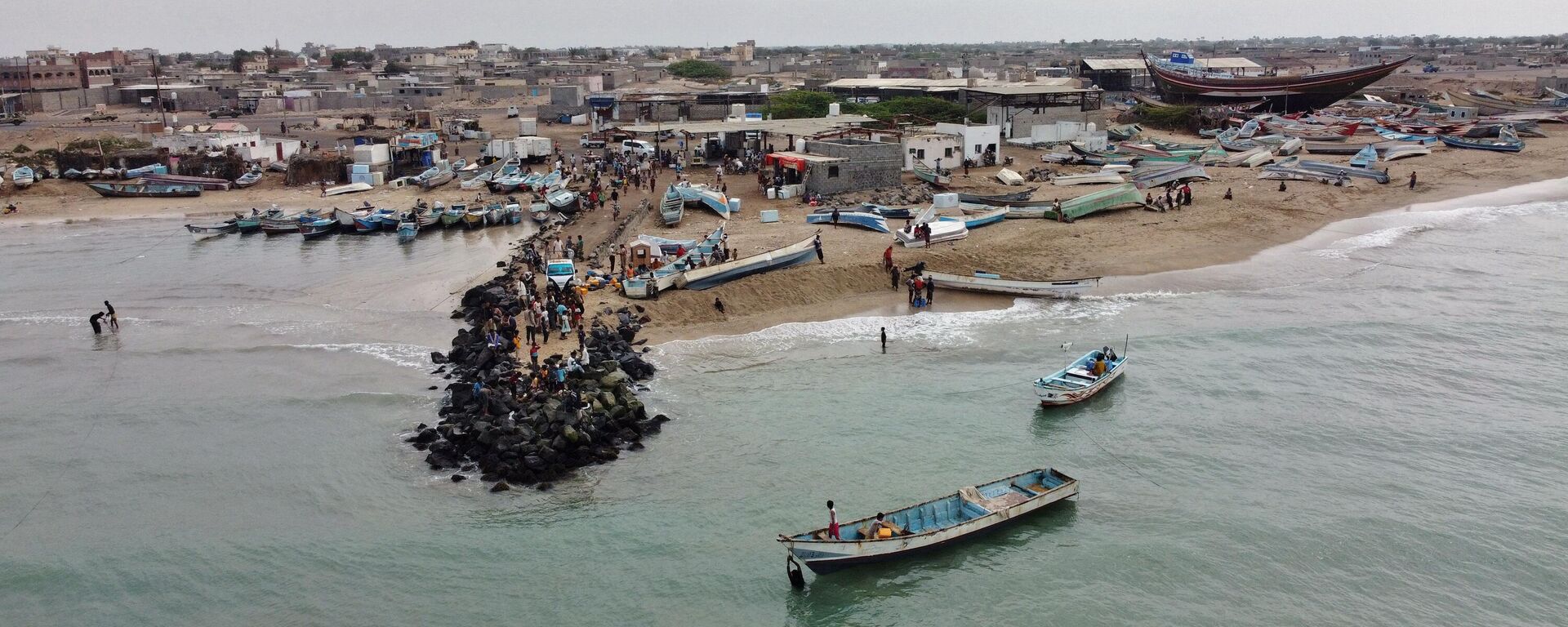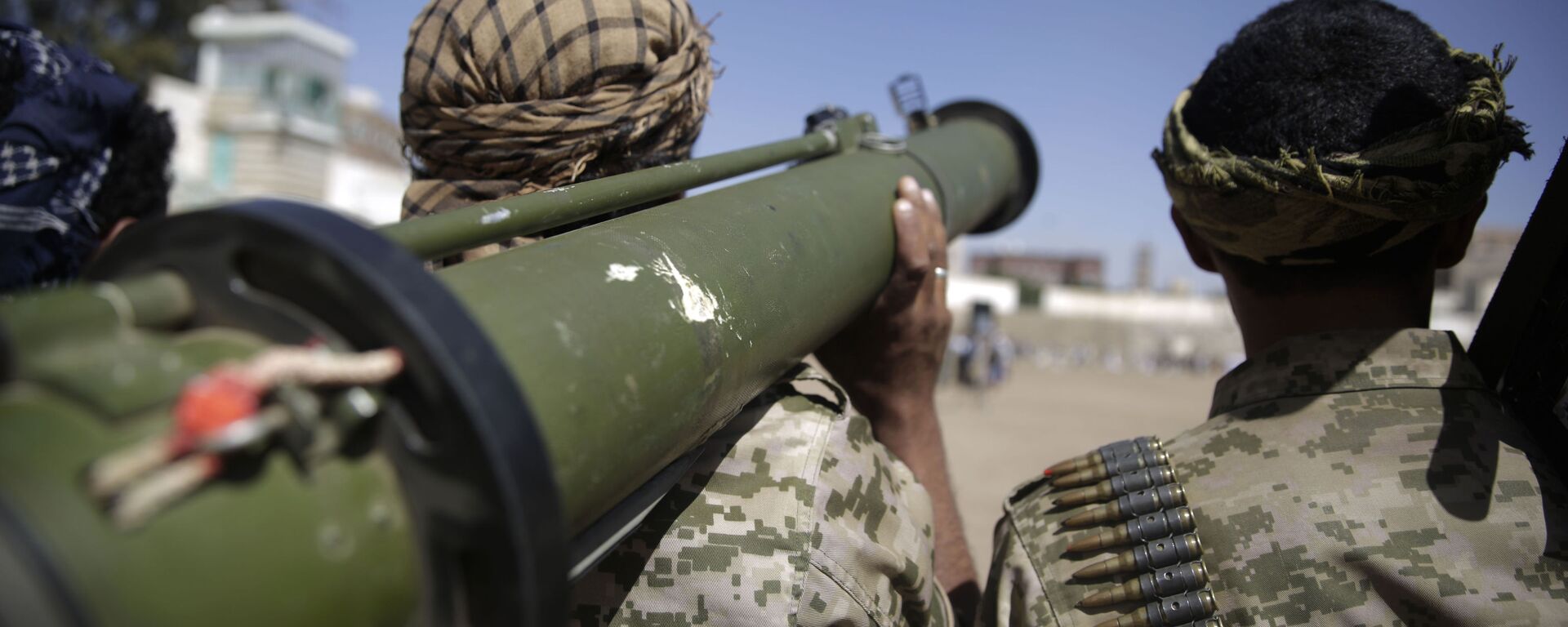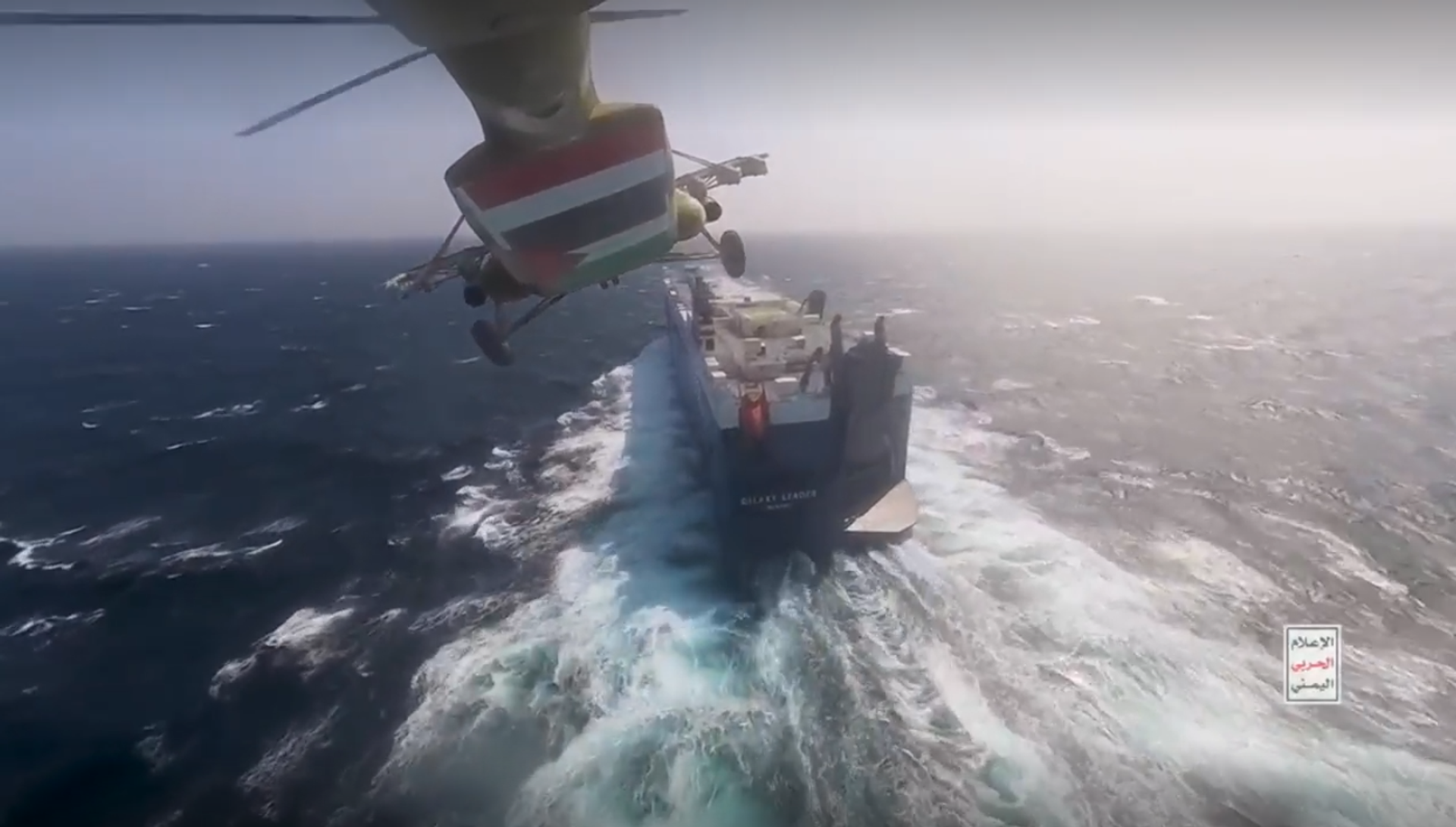https://sputnikglobe.com/20240127/us-think-tanks-cost-of-bidens-attacks-on-houthis-may-exceed-that-of-red-sea-trade-disruption-1116435814.html
US Think Tanks: Cost of Biden's Attacks on Houthis May Exceed That of Red Sea Trade Disruption
US Think Tanks: Cost of Biden's Attacks on Houthis May Exceed That of Red Sea Trade Disruption
Sputnik International
President Joe Biden's claim that the US strikes against Yemen's Houthi militants is necessary to protect the continued flow of global trade doesn't hold water, as per the Quincy Institute of Responsible Statecraft and Cato scholars.
2024-01-27T15:52+0000
2024-01-27T15:52+0000
2024-01-27T15:52+0000
world
us
red sea crisis
joe biden
americans
red sea
yemen
houthis
pentagon
suez canal
https://cdn1.img.sputnikglobe.com/img/07e8/01/0c/1116132755_0:120:2297:1412_1920x0_80_0_0_52b50e026f0ce01c956858991155ffcc.jpg
The US has so far conducted 10 rounds of airstrikes against Houthis in response to the Yemeni militant group's attacks on Israel, US, or UK-linked vessels in the Red Sea over Tel Aviv's brutal war in Gaza.Joe Biden's Department of Defense justifies the strikes by the threat allegedly posed by the Yemenis to global trade. Pentagon Press Secretary Air Force Maj. Gen. Pat Ryder insisted on January 22 that the Houthis' attacks in the Red Sea, including "the unprecedented use of anti-ship ballistic missiles," have "significantly disrupted the free flow of commerce" in "one of the globe's most critical waterways."According to some estimates cited by the Quincy Institute of Responsible Statecraft (QI), the Red Sea crisis led to a 1.3% drop in global trade in December 2023. In the course of the crisis, the Houthis have hijacked one ship and launched at least 34 attacks in the region - making a whopping 90% of container ships divert from the Suez Canal to go around Africa.Nonetheless, the QI doubts the Biden administration's assumption that bombing of Houthis (which is fraught with a risk of a wider regional conflict, given the Shiite Yemeni group's longstanding ties with Iran) is an adequate response to the Red Sea crisis. The think tank's skepticism is shared by Eugene Gholz, a political science professor at Notre Dame University. In particular, Gholz wrote in his January 12 op-ed for the Cato Institute, a libertarian think tank, that "the cost of diverting shipping away from the Red Sea is not very significant in the grand scheme of the global economy."Commenting on the claim of "huge" increases in fuel and personnel costs caused by the necessity to send ships around Africa, Gholz explained that those costs are "actually quite small compared to the cost of the cargo on an average cargo ship." Even if the ship needs another two million dollars' worth of fuel to travel around Africa, this sum should be "amortized across a billion dollars of value of cargo." Eventually, "it's a very marginal change in the cost to consumers of getting their product delivered," per the political scientist.In contrast, the cost of Biden's military operation in the Red Sea is much greater than the cost of shippers' adaptation to the Houthis' disruption, according to Gholz. Referring to the Pentagon's claim that it had so far spent around $1.6 billion on the Red Sea mission, the scholar argues that the real price tag is bigger, given that the cost of weapons fired at Houthis weren't included in this sum.For their part, the Yemeni Houthis are firing relatively cheap projectiles, drones and missiles at vessels in the Red Sea. Most Houthi installations in Yemen, targeted by the US military, also use relatively inexpensive military equipment. Once destroyed, some of this equipment could be then quickly and easily replaced, per Gholz.To illustrate his point Gholz noted that an average Houthi radar destroyed by the Pentagon may cost no more than $2,000, whereas a US missile used to knock it out costs at least a million dollars. "This is a bad cost trade-off," the professor said.The QI is largely seen as left-leaning (it has primarily hired left-leaning senior staff, as per Influence Watch), while Cato is considered libertarian and right-of-center. Their overlapping views concerning the Red Sea crisis show an emerging consensus across ideological lines in the US about the necessity of halting "forever wars" which threaten to stretch the US thin and undermine its economic development.
https://sputnikglobe.com/20240123/1116334660.html
https://sputnikglobe.com/20231221/dc-based-think-tank-red-sea-operation-to-cost-team-biden-highly-1115721736.html
https://sputnikglobe.com/20240127/us-centcom-says-conducted-strike-against-houthi-anti-ship-missile-aimed-into-red-sea-1116424202.html
red sea
yemen
Sputnik International
feedback@sputniknews.com
+74956456601
MIA „Rossiya Segodnya“
2024
News
en_EN
Sputnik International
feedback@sputniknews.com
+74956456601
MIA „Rossiya Segodnya“
Sputnik International
feedback@sputniknews.com
+74956456601
MIA „Rossiya Segodnya“
red sea crisis, operation prosperity guardian, joe biden, us attacks on houthi rebels, israel's gaza war, israel-palestine conflict, middle east, suez canal
red sea crisis, operation prosperity guardian, joe biden, us attacks on houthi rebels, israel's gaza war, israel-palestine conflict, middle east, suez canal
US Think Tanks: Cost of Biden's Attacks on Houthis May Exceed That of Red Sea Trade Disruption
President Joe Biden's claim that the US strikes against Yemen's Houthi militants is necessary to protect the continued flow of global trade doesn't hold water, as per the Quincy Institute of Responsible Statecraft and Cato scholars.
The US has so far conducted 10 rounds of airstrikes against Houthis in response to the Yemeni militant group's attacks on Israel, US, or UK-linked vessels in the Red Sea over Tel Aviv's brutal
war in Gaza.
Joe Biden's Department of Defense justifies the strikes by the threat allegedly posed by the Yemenis to global trade. Pentagon Press Secretary Air Force Maj. Gen. Pat Ryder insisted on January 22 that the Houthis' attacks in the Red Sea, including "the unprecedented use of anti-ship ballistic missiles," have "significantly disrupted the free flow of commerce" in "one of the globe's most critical waterways."
According to some estimates cited by the Quincy Institute of Responsible Statecraft (QI), the Red Sea crisis led to a 1.3% drop in global trade in December 2023. In the course of the crisis, the Houthis have hijacked one ship and launched at least 34
attacks in the region - making a whopping 90% of container ships divert from the Suez Canal to go around Africa.
Nonetheless, the QI doubts the Biden administration's assumption that bombing of Houthis (which is fraught with a risk of a wider regional conflict, given the Shiite Yemeni group's longstanding ties with Iran) is an adequate response to the Red Sea crisis.
The think tank's skepticism is shared by Eugene Gholz, a political science professor at Notre Dame University. In particular, Gholz wrote in his January 12 op-ed for the Cato Institute, a libertarian think tank, that "the cost of diverting shipping away from the Red Sea is not very significant in the grand scheme of the global economy."
"You would need very fine-grained data to try to find any effect," Gholz told the QI. "You see articles that say consumer prices have gone up in the last couple months. The Red Sea issue has been happening, but that's hardly the only thing that's been happening in the global economy, right?"
Commenting on the claim of "huge" increases in fuel and personnel costs caused by the necessity to send ships around Africa, Gholz explained that those costs are "actually quite small compared to the cost of the cargo on an average cargo ship." Even if the ship needs another two million dollars' worth of fuel to travel around Africa, this sum should be "amortized across a billion dollars of value of cargo." Eventually, "it's a very marginal change in the cost to consumers of getting their product delivered," per the political scientist.

23 January 2024, 18:59 GMT
In contrast, the cost of Biden's military operation in the Red Sea is much greater than the cost of shippers' adaptation to the Houthis' disruption, according to Gholz. Referring to the Pentagon's claim that it had so far spent around $1.6 billion on the Red Sea mission, the scholar argues that the real price tag is bigger, given that the cost of weapons fired at Houthis weren't included in this sum.
In December, the QI estimated that each US munition used to intercept Houthi rockets and drones costs between $1 million and $4.3 million. Per the think tank, US missiles reportedly used to shoot down Houthi projectiles and UAVs include the SM-2 ($2.1 million), SM-6 ($4.3 million), ESSM Sea Sparrows ($1.7 million), and Rolling Airframe missile ($905,000).
For their part, the Yemeni Houthis are firing
relatively cheap projectiles, drones and missiles at vessels in the Red Sea. Most Houthi installations in Yemen, targeted by the US military, also use relatively inexpensive military equipment. Once destroyed, some of this equipment could be then quickly and easily replaced, per Gholz.

21 December 2023, 10:58 GMT
To illustrate his point Gholz noted that an average Houthi radar destroyed by the Pentagon may cost no more than $2,000, whereas a US missile used to knock it out costs at least a million dollars. "This is a bad cost trade-off," the professor said.
But that is not all: "There's also risk," Gholz warned. "If this gets some Americans killed, if the Houthis got a lucky shot and they actually hurt someone, that's a huge cost. If the United States gets drawn further into the maelstrom of Yemeni politics, or if the American hawks satisfy their wildest dream and leverage this into getting the United States to attack Iran, that's an incredibly costly thing."
The QI is largely seen as left-leaning (it has primarily hired left-leaning senior staff, as per Influence Watch), while Cato is considered libertarian and right-of-center. Their overlapping views concerning the Red Sea crisis show an emerging consensus across ideological lines in the US about the necessity of halting "forever wars" which threaten to stretch the US thin and undermine its economic development.

27 January 2024, 03:14 GMT






